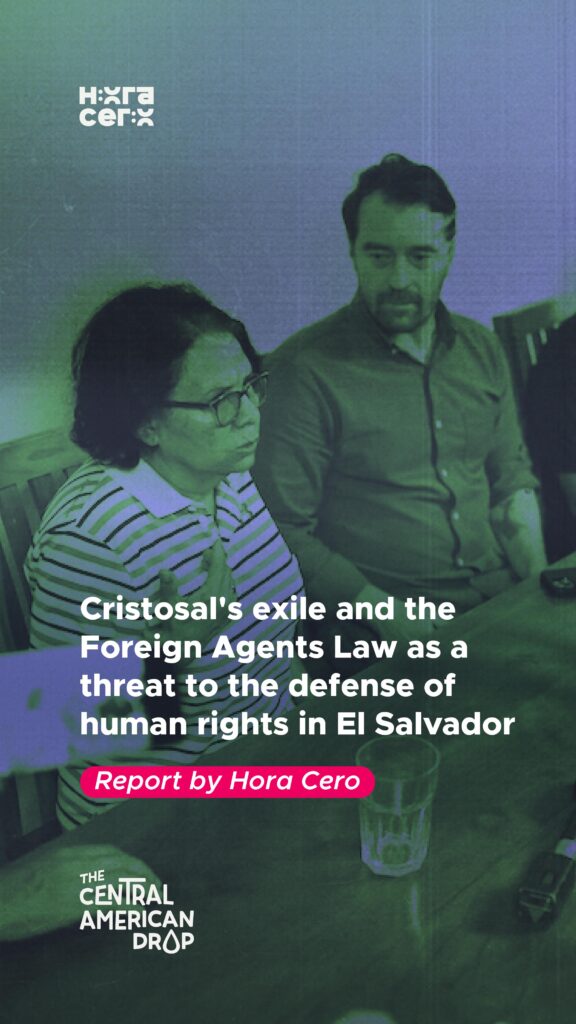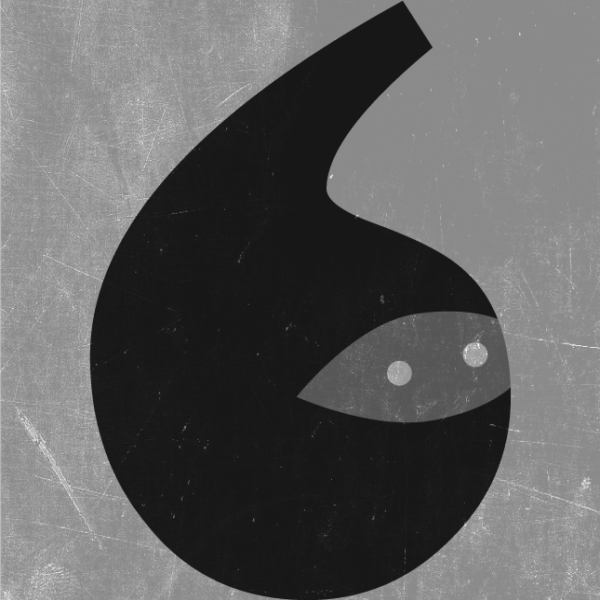
El Salvador, a country marked by decades of armed conflict, political crisis, and criminal violence, has seen Cristosal as a pillar in the defense of human rights for 25 years. This organization, with a long history of advocacy, is now facing, along with other initiatives, one of its worst crises: the forced exile of its team due to the latest measures approved by the Nayib Bukele regime.
The contributing factors were diverse: threats to several members of their team, the arrest of Ruth López — anti-corruption coordinator, human rights defender, and one of the most influential lawyers, according to the BBC — and the Foreign Agents Law, a legal instrument that has been described by civil society as a weapon of control and punishment. This is the latest blow to human rights work in El Salvador.
In 2021, the Nayib Bukele administration had already presented a proposal imposing an aggressive 40% tax on donations and funds from «foreign entities.» At the time, the diplomatic corps based in the country spoke out against it, and the proposal was shelved.
Article 3 of the Law defines a foreign agent as «any natural or legal person, national or foreign, who within the territory of El Salvador carries out activities that respond to the interests of, are controlled or financed, directly or indirectly, by a foreign principal.»
In 2025, Bukele took advantage of a problem that had escalated onto the media agenda: the El Bosque Cooperative’s debt of more than $800,000, which has resulted in the dispossession of its farmland and has left approximately 300 families homeless. The community decided to take to the streets on May 12 to ask President Bukele for help, but all they received was repression from the Military Police.
After the protest, the unconstitutional president of El Salvador said he would introduce the law in order to require NGOs to pay a tax corresponding to 30% of their donations, which would be used to «settle the Cooperative’s debt» and thus «NGOs will be able to fulfill their mission of supporting the people,» he said through his X account. The law was approved in May 2025.
Luis Rivera, a lawyer for the Movement for the Defense of the Working Class, explained that the law suffered from being approved through an inadequate process. According to him, the Legislative Assembly justified the introduction of the proposal by waiving the process, arguing that there was no legal framework in the country regulating the actions of social organizations and NGOs, when in reality, these are already regulated by the Registry of Nonprofit Associations and Foundations, as well as the tax mechanisms set forth in the Income Tax Law and the Law against Money and Asset Laundering.
He adds that the requirements of urgency and necessity that the Constitutional Chamber of the Supreme Court of Justice demands for introducing a bill through exemption from processing do not exist. Discussion of this bill was also limited, with only six representatives participating in the debate for approximately one hour.

The LAEX establishes mandatory registration for individuals and organizations that receive foreign funding, but introduces severe and ambiguous restrictions that, according to social organizations, limit the right of association and expression. Rivera exemplifies that Article 9 prohibits activities of «political influence» or that generate «disturbance of public order,» but without clearly defining what acts are prohibited, opening the door to arbitrary interpretations and violations of freedom of expression.
Furthermore, the law imposes a 30% tax on foreign funds, a disproportionate burden on nonprofit organizations that depend on these resources for social programs in vulnerable communities. The stipulated fines, which range from $100,000 to $250,000, far exceed the financial capacity of many NGOs and could lead to the forced termination of their activities.
Although the law does not specify exact crimes, Rivera warns that its provisions are ambiguous, as it opens a wide scope for the criminalization of defenders and organizations, which could lead to criminal charges for alleged administrative sanctions linked to non-compliance with the requirements for registering activities.
«Many associations have not submitted nor will submit the registration application for various reasons, for example, that the external cooperation they received has been withdrawn. Others prefer to continue working informally, without presenting documentation, because they consider the law to be illegal and arbitrary. Sanctions may be imposed. Currently, no specific cases are known, but there is a possibility that not only economic sanctions but also criminal proceedings could be imposed, although the law does not explicitly mention what the possible crimes could be.”
For Luis Rivera and those who make up the MDCT, the LAEX presents defects in form and content, violating Articles 85, 135, 1, 2, and 144, among others, of the Constitution of the Republic. Therefore, they filed a claim of unconstitutionality before the Constitutional Chamber, requesting precautionary measures and the suspension of the law’s implementation until a resolution is issued.
«We invite the population to make use of all the tools that the current system offers us. While there aren’t many, due to the concentration of power and the limited civic and legal space, it’s crucial to take advantage of the ones we still have. We must file all necessary complaints to assert our rights, regardless of the response we receive. The reduction of civic and legal spaces is worrying, so it is imperative to use all available avenues to report irregularities and demand respect for our rights.”
Founded at a time when El Salvador was experiencing the devastating effects of the 2001 earthquakes and the resurgence of gangs, Cristosal began its work at the initiative of two Anglican bishops to provide protection to affected communities.
Although the initial aim was to provide services for foreign asylum seekers, the urgency of forced displacement, the needs of the communities, and the shocks of reality led to its expansion to include more people.
“There was no room to ignore reality: when people began to be persecuted by gangs, our offices were filled,” recalls Noah Bullock, Cristosal’s executive director, in a conversation with HoraCero. Direct contact with communities like those in Bajo Lempa — an area repopulated by people exiled during the armed conflict — allowed the organization to develop a comprehensive approach where community development and human rights intertwine to open up opportunities.
“But the most important work, what truly drove the organization’s development, was our support for internally displaced people. We were among the first to begin serving this population; we advocated extensively for the Salvadoran government to recognize this phenomenon, which it had been denying. The State’s position was total denial,” adds Bullock.
The director describes the Constitutional Court’s ruling recognizing forced displacement in El Salvador, issued on July 13, 2018, as one of the organization’s greatest achievements. This historic ruling forced the government of Salvador Sánchez Cerén and the Legislative Assembly to recognize the phenomenon — primarily caused by gangs and other forms of organized crime. It also mandated the design and implementation of public policies and legal reforms to protect victims.
Subsequently, the Special Law for the Comprehensive Care and Protection of Persons in a Condition of Internal Forced Displacement was created. With a touch of irony, Bullock highlights that the law that passed in 2020, already during the Bukele administration, was the proposal drafted by Cristosal.
“But the subsequent problem was that it remained nothing more than a law; no regulations were ever created. We made budget proposals to fund the program, but there was no will to strengthen a national protection system,” Bullock adds.
The director reflects that, in 25 years, despite the tensions they’ve sustained with various governments in power, they hadn’t faced a situation so serious that it led to their exile from office, until now.
“We had even accused President Sánchez Cerén of extrajudicial killings, because he was the only one who waged war against gangs, and even the leaders themselves acknowledged this in recent interviews. The PDDH had documented cases. However, they weren’t open to dialogue,» Bullock explains.
He adds that the persecution didn’t begin with the defenders’ arrest in recent months, but rather during President Bukele’s first term.
“During the first five years, it wasn’t us who were directly subjected to this punishment, but rather community organizations, the anti-mining movement, veterans who organized marches—and they were indeed criminalized. Within the framework of the state of emergency, we don’t even know how many union members, community leaders, and environmental defenders, but at a more local level, have been taken away and disappeared into prisons. This is a regime of terror,” he said.
However, despite the adversities, Bullock reaffirms Cristosal’s commitment to historical truth. He believes that El Salvador “deserves better than being subjected to gangs or a dictatorship” and reminds us that there are no “good dictatorships” or justifications for renouncing the rights of the people.
His hope lies in the population and social organizations, and also in the history that shows that no repression has managed to silence the struggle for human rights.

| Cookie | Duración | Descripción |
|---|---|---|
| cookielawinfo-checkbox-analytics | 11 months | This cookie is set by GDPR Cookie Consent plugin. The cookie is used to store the user consent for the cookies in the category "Analytics". |
| cookielawinfo-checkbox-functional | 11 months | The cookie is set by GDPR cookie consent to record the user consent for the cookies in the category "Functional". |
| cookielawinfo-checkbox-necessary | 11 months | This cookie is set by GDPR Cookie Consent plugin. The cookies is used to store the user consent for the cookies in the category "Necessary". |
| cookielawinfo-checkbox-others | 11 months | This cookie is set by GDPR Cookie Consent plugin. The cookie is used to store the user consent for the cookies in the category "Other. |
| cookielawinfo-checkbox-performance | 11 months | This cookie is set by GDPR Cookie Consent plugin. The cookie is used to store the user consent for the cookies in the category "Performance". |
| viewed_cookie_policy | 11 months | The cookie is set by the GDPR Cookie Consent plugin and is used to store whether or not user has consented to the use of cookies. It does not store any personal data. |